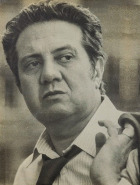

It was in France that Mário Soares lectured as a visiting professor at the universities of Vincennes, Rennes, and the Sorbonne, covering subjects related to contemporary Portugal, including the Estado Novo regime. He also enrolled at the University of Clermont-Ferrand, where he worked on a doctoral thesis on Portugal’s participation in the Great War from French and British perspectives, also addressing the emergence of the First Republic. His supervisor was Albert Silbert, with additional support from Vitorino Magalhães Godinho ( “ Carta de Mário Soares para Nuno Simões ,” [Letter from Mário Soares to Nuno Simões] 11998.132, 10/02/1971).
However, his research was conducted under significant constraints, dictated by the demands of his activities during exile and interrupted by the revolution of 1974. He sought a grant from the Calouste Gulbenkian Foundation, but despite strong recommendations from academics, the Foundation declined, arguing that Soares had not “demonstrated credentials as a historian.” Soares himself suggested political motives behind the refusal (Avillez, Soares… , 1996, p. 249). He did, however, benefit from a grant from the Friedrich Ebert Foundation, which supplemented his income as a professor and lawyer ( “ Carta de Mário Soares para Dr. Grunwald,” [Letter from Mário Soares to Dr. Grunwald], 00665.001.065, 27/01/1971). At the same time, he was preparing a book to be titled História de Portugal do Séc. XX [History of Portugal in the 20th Century], drawing some inspiration from the work directed by Jean-Baptiste Duroselle, although there is no evidence that he pursued this project further ( “ Carta de Mário Soares para Vitorino Magalhães Godinho,” [Letter from Mário Soares to Vitorino Magalhães Godinho ] 00530.072, 26/01/1974).
Beyond his academic pursuits in France, Soares continued writing and giving interviews to the international press, criticising the Portuguese regime in the context of an intense political journey as part of the opposition to the Estado Novo . He connected with numerous European and American politicians and intellectuals, building relationships and consolidating his socialist ideology (Barreto, “Soares, Mário,” 2000, pp. 450–451). In 1973, in Bad Münstereifel, Germany, he co-founded the Socialist Party and became its first secretary-general, playing a pivotal role in Portuguese political life during the revolution of 25 April 1974.
This work is financed by national funds through FCT - Foundation for Science and Technology, I.P, in the scope of the projects UIDB/04311/2020 and UIDP/04311/2020.
